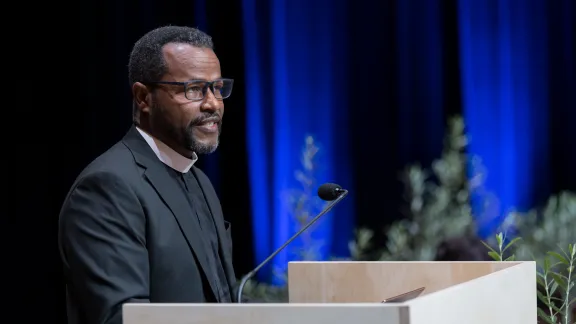Ethiopian seminary president speaks at second of three Assembly sessions on ‘One Body, One Spirit, One Hope’
“Unity is in the nature of the church,” therefore the task of Christians is to nurture “oneness in spirit” through open, respectful dialogue in pursuit of a common goal. That message was at the heart of a presentation by Rev. Dr Bruk Ayele Asale, President of the Mekane Yesus Seminary (MYS) in Ethiopia, to participants in The Lutheran World Federation (LWF) Thirteenth Assembly in Kraków, Poland.
Church leaders and representatives from across the world are gathered for the 13 to 19 September Assembly, LWF’s highest decision-making body.

Rev. Dr Bruk Ayele, president of the Mekane Yesus seminary in Ethiopia speaks as part of a thematic plenary of the theme of 'One Spirit', at the LWF Thirteenth Assembly. Photo: LWF/Albin Hillert
MYS is the higher theological training institution of the Ethiopian Evangelical Church Mekane Yesus (EECMY) which, numbering over 12 million members, is the largest of the 150 Lutheran churches making up the global LWF communion. It is a very diverse church, representing different Lutheran and Reformed liturgical traditions, with congregations comprising people from the different ethnic and linguistic backgrounds of the country.
Speaking at the second of three plenary sessions addressing the assembly theme, ”One Body, One Spirit, One Hope,” Asale began by noting that the churches’ call to unity is urgent today, just as it was at the time of St Paul when there was “fragmentation and disintegration among God’s children.”
The call to “oneness in spirit is indispensable because all churches sincerely confess and preach that they belong to Christ.”
Rev. Dr Bruk Ayele Asale, President of Ethiopia’s Mekane Yesus seminary.
Reflecting on some of the spirits that cause suffering and division in today’s world, he pointed to “the global systemic oppression, the divide between North and South, East and West, the brutality of the powerful and an endless cry of the powerless.” He spoke about conflicts such as the civil war in his own country, as well as fighting between ethnic groups and clans which have caused deaths and the destruction of churches. “This is the outcome of a spirit of hatred,” he said, “a spirit that is opposed to unity and the Holy Spirit.”
In the religious arena, he noted the “countless misleading theologies” which are used to exploit and control the poor and vulnerable, violating “inherent human dignity, putting the life of people in danger.” This is a problem in many parts of the world, he said, mentioning the recent case in Kenya, where hundreds of followers died from starvation after the cult leader persuaded them to fast to death.
The call to “oneness in spirit is indispensable,” Asale affirmed, “because all churches sincerely confess and preach that they belong to Christ and live for the cause of the gospel.” This call to unity, he continued, refers primarily to the “multidimensional movement of churches and Christians, whose goal is both the visible unity of the churches and an integration of mission, service, and renewal.”
Openness, mutual respect, common goal
Looking back at the history of the ecumenical movement, begun over a century ago, he noted how the search for “oneness in spirit among the churches can and should be built on global, regional and local levels.” It does not mean “succumbing to the identity of the other, he said, but “rather it is about treating all equally and fairly,” realizing that member churches and entire global communions need the collaboration of others in order to confront the challenges of our times.
Progress on the path to unity, he said, requires openness or “readiness to be changed and renewed by what one learns from the other.” Secondly, it requires mutual respect to overcome negative stereotyping and “the tendency to demonize the other without justification.” Thirdly, it requires recognition that all churches share a common goal, “namely serving and worshiping the same Lord to whom the church belongs.”
Though “we may be divided institutionally or physically,” Asale concluded, “we can continue being one in the Spirit, a mystical way of life we experience when we are living in Christ’s union.”
Responses from Chile and Finland
Responding to Asale’s presentation, Bishop Izani Bruch, Evangelical Lutheran Church in Chile, stressed “how important this unity in the Spirit has been” in her context as leader of a minority church in Latin America. Being part of the LWF “empowers us and sustains us,” she said, because “we know that we are accompanied by the communion of 150 churches and by more than 77 million Lutherans and other churches.” She pointed to the vital support provided by the LWF and the World Council of Churches during 17 years of dictatorship in Chile.
Bruch spoke of the ongoing challenges in her region, including poverty and injustice, exclusion and polarization, hate speech and growing political and religious fundamentalism, as well as misleading theologies that have led to a push back on human rights. In the face of these challenges, she said, “unity in the Spirit is an evangelical mandate, not an option.”
Between heaven and earth
In a second response, Finnish theologian and professor at Fuller Theological Seminary in the United States, Rev. Dr Veli-Matti Kärkkäinen, drew inspiration from a verse in the book of Ezekiel: “The Spirit lifted me up between earth and heaven” [Ez 8:3]. From this place, Kärkkäinen said, “we will hear the cries of the Spirit in the midst of enormous suffering and pain,” learning how to discern “between the One Spirit of God and the many other spirits [….] of violence, oppression and greed.”
Basing his words on the acronym of Luther’s name, he spoke firstly of Latitude, how “the Spirit makes room, creates space […] in a world of narrow-minded attitudes and postures.” Secondly, he spoke of the need for Unity in the One Spirit, “not forced uniformity,” but rather unity in diversity. Thirdly, he talked of the spirit of Tenacity, or “the capacity to stand firm for what is right and what is good for all people, all Christians.”
Fourthly, Kärkkäinen reflected on the need for Heartfulness, that is “listening to what the gentle voice of the Spirit is speaking to your heart.” Next, he spoke about Empowerment, or the way the Spirit “empowers the church for prophetic speech and for healing the sick.” Finally, he talked about the need for “ever-continuing, fresh Reformation, which was the theme explored at the previous LWF Assembly in 2017.”
